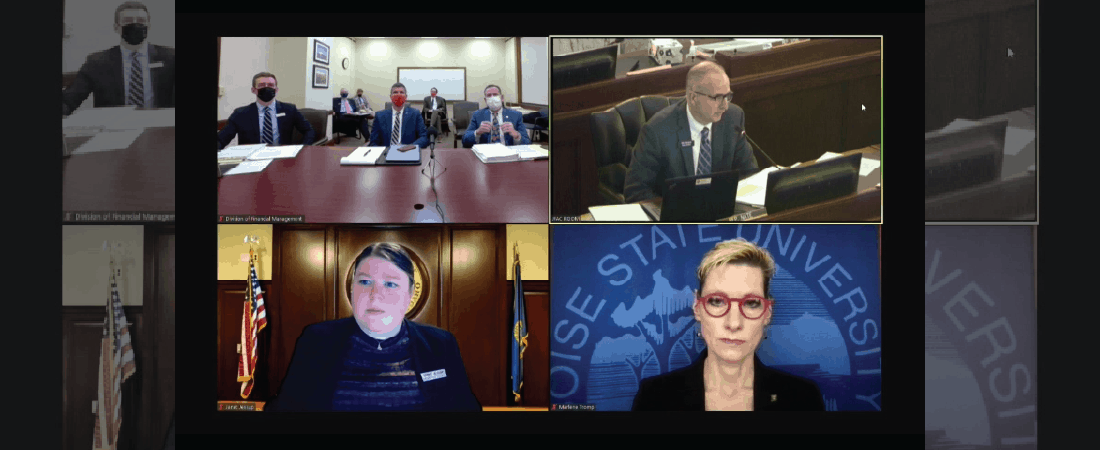


Boise State University President Marlene Tromp sent evidence to the Legislature ironically proving BSU’s effort to build what Jonathan Haidt calls a Social Justice University.
Tromp received many questions during BSU’s budget hearing on Friday, Jan. 29, referencing our report, “Social Justice Ideology in Idaho Higher Education.” Legislators asked Tromp about the university ending its contract with the Boise Police Department, support for Black Lives Matter (BLM), general education requirements, the Big City Coffee scandal, and more.
Let's examine the facts:
CLAIM: “There has been a persistent narrative that we ended our contract with Boise Police. This is factually false. We renewed our contract,” Tromp claimed during the university’s budget hearing.
OUR REPORT: “Boise State announced it would not renew its contract with Boise Police Department (Boise PD) after consulting with student activists. In the meantime, it requires all Boise PD officers to take implicit bias training if they are assigned to campus.”
Tromp sent BSU’s official Boise Police services agreement to the Legislature. The document states, “Boise State University will enter into the fifth and final year of the previously executed Law Enforcement Services Agreement Between Boise State University and Boise City.” The agreement continues, “In the fifth and final year of the Agreement, the university seeks the following from Boise City and Boise City Police. … Additional implicit bias training for officers assigned to campus.”
CLAIM: In a letter to the Joint Finance Appropriations Committee (JFAC), Tromp states, “Students always have options in [general education] courses. … Individual choice is something upon which we place high value.”
OUR REPORT: “Students encounter social justice education throughout the curriculum at BSU. Students cannot avoid exposure to social justice education, though they can avoid American history, government and literature.”
BSU’s course catalog, available on its website, is the sole source for our analysis of general education requirements. Catalog course descriptions show students are required to take a minimum of four social justice courses. The vast majority of general education course options are dedicated to social justice. UF 200, Foundations of Ethics & Diversity, for example, is where “diversity lives,” according to Assistant to the Vice President of Equity Initiatives, Francisco Salinas. The UF 200 requirement has 37 options, all of which are dedicated to indoctrinating students with social justice. Foundations of Oral Communications has only two course options that are both dedicated to teaching students core tenets of social justice ideology like oppressive hierarchical power structures and a hatred for Western values and Judeo-Christian heritage. UF100 courses, Foundations of Intellectual Life, have 11 options. Two of these course options are “God and the good life” and “Moral Courage,” as Tromp’s letter points out. But the remaining eight UF100 courses are social justice classes, as our report explains. The existence of “individual choice” in general education courses is an illusion if all courses, or the majority of courses, are dedicated to social justice education.
CLAIM: Tromp’s letter to JFAC states, “Boise State does not fund the Black Lives Matter organization.”
FACT: BSU has a transparency problem regarding its relationship with Black Lives Matter.
A simple statement is not sufficient evidence proving BSU has not provided funds or diverted university resources to BLM, a group whose leaders are self-described “trained Marxists.” The Music, Sociology, Criminal Justice and Theatre Departments have issued statements supporting the BLM organization and committing to future action to end “oppression,” “systemic” hatred, and “white privilege” in Idaho. The Criminal Justice department's statement is included in our report. Since the university's budget hearing, these statements were removed from the BSU website without any explanation. In addition, BSU has not explained why BLM Boise named BSU as a “partner” on its website in July 2020.
CLAIM: The letter states, “At no time did the administration at Boise State ask Big City Coffee to leave campus.”
OUR REPORT: BSU created an environment so untenable that Big City Coffee had no choice except to leave campus, causing the small business to lose more than $30,000.
Student activists on the Inclusive Excellence Council, who were appointed by BSU administrators, claimed Big City Coffee’s support for police proved the university's vendor process was an example of “white supremacy.” Administrators and advisors for the IESC agreed with the characterization and “encouraged IESC to take an active role in university hiring, contracting and other policy matters in the future.” Francisco Salinas claimed pushback against Big City Coffee and getting them to leave could be “the beginning of a revolution where we say that we have a standard for corporate partnerships that we have.” BSU officials even met with Big City Coffee’s owner, Sarah Fendley, and proposed her small business provide scholarships and jobs for “people of color” as a concession for remaining on campus. Tromp’s letter does not refute any of these facts.
CLAIM: The letter states, “Boise State supports and never infringes upon First Amendment Rights.”
FACT: Under BSU’s current free speech policies, the university has indoctrinated students, intimidated vendors, discriminated in hiring based on race and gender, and harassed professors like Dr. Yenor who dare dissent.
Protecting free speech on college campuses is not enough. Conservative speakers will never be invited to campus if everyone on the campus is a social justice warrior. Free speech with no differences of opinion is an illusion. BSU still has the power to create a culture of fear wherein students and faculty walk on eggshells.
Tromp’s evidence proves too much. The Legislature can now see BSU clearly for what it is – a Social Justice University.


